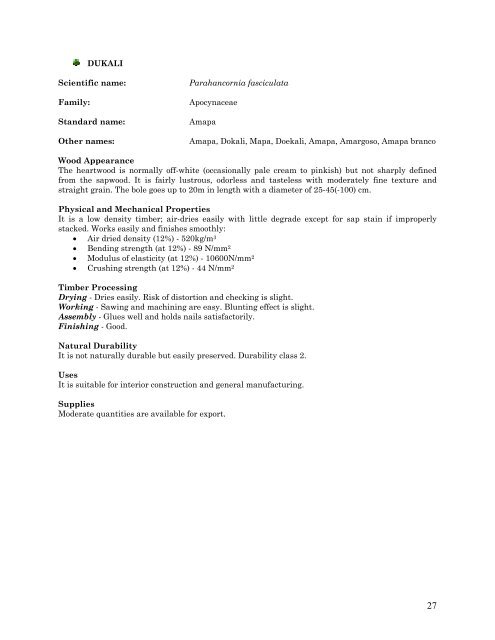21 Species Booklet 2004.pdf - Guyana Forestry Commission
21 Species Booklet 2004.pdf - Guyana Forestry Commission
21 Species Booklet 2004.pdf - Guyana Forestry Commission
You also want an ePaper? Increase the reach of your titles
YUMPU automatically turns print PDFs into web optimized ePapers that Google loves.
DUKALI<br />
Scientific name: Parahancornia fasciculata<br />
Family: Apocynaceae<br />
Standard name: Amapa<br />
Other names: Amapa, Dokali, Mapa, Doekali, Amapa, Amargoso, Amapa branco<br />
Wood Appearance<br />
The heartwood is normally off-white (occasionally pale cream to pinkish) but not sharply defined<br />
from the sapwood. It is fairly lustrous, odorless and tasteless with moderately fine texture and<br />
straight grain. The bole goes up to 20m in length with a diameter of 25-45(-100) cm.<br />
Physical and Mechanical Properties<br />
It is a low density timber; air-dries easily with little degrade except for sap stain if improperly<br />
stacked. Works easily and finishes smoothly:<br />
• Air dried density (12%) - 520kg/m 3<br />
• Bending strength (at 12%) - 89 N/mm 2<br />
• Modulus of elasticity (at 12%) - 10600N/mm 2<br />
• Crushing strength (at 12%) - 44 N/mm 2<br />
Timber Processing<br />
Drying - Dries easily. Risk of distortion and checking is slight.<br />
Working - Sawing and machining are easy. Blunting effect is slight.<br />
Assembly - Glues well and holds nails satisfactorily.<br />
Finishing - Good.<br />
Natural Durability<br />
It is not naturally durable but easily preserved. Durability class 2.<br />
Uses<br />
It is suitable for interior construction and general manufacturing.<br />
Supplies<br />
Moderate quantities are available for export.<br />
27


